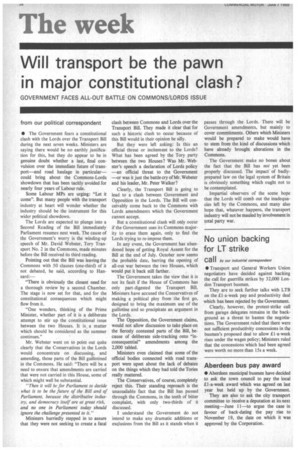Will transport be the pawn in major constitutional clash ?
Page 40

If you've noticed an error in this article please click here to report it so we can fix it.
GOVERNMENT FACES ALL-OUT BATTLE ON COMMONS/LORDS ISSUE from our political correspondent
The Government fears a constitutional clash with the Lords over the Transport Bill during the next seven weeks. Ministers are saying there would be no earthly justification for this, but they do appear to be in genuine doubt whether a last, final convulsion over the immediate future of transport—and road haulage in particular— could bring about the Commons-Lords showdown that has been tacitly avoided for nearly four years of Labour rule.
Some Labour MPs are urging: "Let it come". But many people with the transport industry at heart will wonder whether the industry should be the instrument for this wider political showdown.
The Lords are expected to plunge into a Second Reading of the Bill immediately Parliament resumes next week. The cause of the Government's worry is the winding-up speech of Mr. David Webster, Tory Transport No. 2 in the Commons, made minutes before the Bill received its third reading.
Pointing out that the Bill was leaving the Commons with 50 clauses (one-third) of it not debated, he said, according to Hansard:— "There is obviously the closest need for a thorough review by a second Chamber. The stage is now set for that, and for the constitutional consequences which might flow from it.
"One wonders, thinking of the Prime Minister, whether part of it is a deliberate attempt to stir up the constitutional issue between the two Houses. It is a matter which should be considered as the summer continues."
Mr. Webster went on to point out quite clearly that the Conservatives in the Lords would concentrate on discussing, and amending, those parts of the Bill guillotined in the Commons. He said: "There will be a need to ensure that amendments are carried that were not carried in this House, some of which might well be substantial.
"Then it will be for Parliament to decide what is to be the future of the Bill and of Parliament, because the distributive industry, and democracy itself are at great risk, and no one in Parliament today should ignore the challenge presented to it."
Ministers hurriedly stepped in to assure that they were not seeking to create a fatal clash between Commons and Lords over the Transport Bill. They made it clear that for such a historic clash to occur because of this Bill would in their opinion be silly.
But they were left asking: Is this an official threat or incitement to the Lords? What has been agreed by the Tory party between the two Houses? Was Mr. Webster's speech a declaration of Lords policy — an official threat to the Government — or was it just the battle cry of Mr. Webster and his leader, Mr. Peter Walker?
Clearly, the Transport Bill is going to lead to a clash between Government and Opposition in the Lords. The Bill will conceivably come back to the Commons with Lords amendments which the Government cannot accept.
But a constitutional clash will only occur if the Government uses its Commons majority to erase them again, only to find the Lords trying to re-impose them.
In any event, the Government has abandoned hope of getting Royal Assent for the Bill at the end of July. October now seems the probable date, barring the opening of all-out war between the two Houses, which would put it back still farther.
The Government takes the view that it is not its fault if the House of Commons has only part-digested the Transport Bill. Ministers have accused the Conservatives of making a political ploy from the first go, designed to bring the maximum use of the guillotine and so precipitate an argument in the Lords.
The Opposition, the Government claims, would not allow discussion to take place on the fiercely contested parts of the Bill, because of deliberate side-tracking onto "inconsequential" amendments among the 2,000 tabled.
Ministers even claimed that some of the official bodies connected with road transport were upset about the lack of debates on the things which they had told the Tories really mattered.
The Conservatives, of course, completely reject this. Their standing reproach is the unassailable fact that the Bill has passed through the Commons, in the teeth of bitter complaint, with only two-thirds of it discussed.
I understand the Government do not intend to make any dramatic additions or exclusions from the Bill as it stands when it passes through the Lords. There will be Government amendments, but mainly to cover commitments. Others which Ministers • would be prepared to make would have to stem from the kind of discussions which have already brought alterations in the Commons.
The Government make no bones about the fact that the Bill has not yet been properly discussed. The impactof badlyprepared law on the legal system of Britain is obviously something which ought not to be contemplated.
Impartial observers of the scene hope that the Lords will comb out the inadequacies left by the Commons, and many also hope that, whatever happens, the transport industry will not be mauled by involvement in total party war.
















































































































































